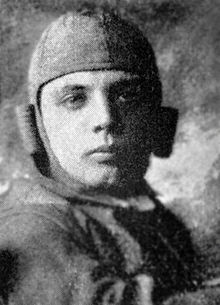Gustav Otto
| Gustav Otto | |
|---|---|

Portrait of Gustav in 1910
|
|
| Born |
12 January 1883 Cologne, Germany |
| Died | 28 February 1926 (aged 43) |
| Nationality | German |
| Education | Technical College in Hanover, Karlsruhe and Munich |
| Occupation | Mechanical Engineer; Entrepreneur |
| Known for | Indirect founder of BMW AG |
| Title | Founder; General Director |
| Parent(s) | Nikolaus August Otto |
Gustav Otto (12 January 1883 – 28 February 1926) was a German aircraft and aircraft-engine designer and manufacturer.
Otto was born in Cologne to Nikolaus August Otto, the founder of N. A. Otto & Cie. and inventor of the four-stroke internal combustion engine. It is therefore regarded that his interest in engines, specifically aircraft and the manufacture thereof, was something he inherited from his father at an early age.
Otto was regarded as successful and career-minded, and moved in elevated social circles. He attended a higher secondary school in Cologne, and had internships at machine tool manufacturers. Later, he attended the Technical Colleges in Hanover, Karlsruhe and Munich for further engineering study. He is believed to have remained in Munich after completing his studies to co-found the Bayrische Autogarage Company. Gustav had a difficult time getting out from under his father's long shadow. He was prone to bouts of depression, which affected his work.
Gustav competed successfully in cars and on motorcycles in various sports events. He was also very active in the earliest days of aviation. On 10 April 1910 he obtained his pilot's licence on an Aviatik biplane (also he took over an agency for this aircraft). He founded the "Aeroplanbau Otto-Alberti" workshop (renamed "Gustav Otto Flugmaschinenfabrik" in 1911) at the Puchheim airfield. In 1910, Gustav built a biplane he designed; it created a sensation throughout Germany. Gustav, along with a few others, flew machines made of wood, wire, canvas and powered by Daimler aeroengines. Gustav sold over 30 aircraft through his company, which also included a flight school. Through their passion for these flying machines, they helped transform aviation from a do-it-yourself hobby to an industry vital to the military, especially after the breakout of World War I. Interestingly, Ernst Udet, the second-highest scoring German flying ace of World War I (second only to the Red Baron), earned his pilots license from private training with Gustav at this time.
Gustav founded numerous companies for the purpose of building aircraft. For his first company, the following entry was recorded in the Munich Company Register under the number 14/364 on 15 March 1911: "Gustav Otto in Munich, Flugmaschinenfabrik (aircraft factory), Office Karlstrasse 72". Shortly afterwards, Otto moved the workshop from its original location at 37, Gabelsberger Strasse to its new premises at 135, Schleissheimer Strasse, and in 1913 started to construct a new factory at 76, Neulerchenfeldstrasse (later Lerchenauer Strasse)at the Oberwiesenfeld (the business was renamed "Otto-Werke" in 1915).
...
Wikipedia
